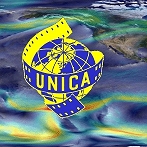
GENERAL ASSEMBLY, Zeche Zollern, Dortmund,
Germany
11th August 2017
Page 3
Committee Members Attending
Dave Watterson (President)
Jeanne Glass (Vice-President)
Bernhard Lindner (Vice-President)
Jacqueline Pante (Secretary General)
Thomas Kräuchi (Treasurer)
Advisers:
Tatyana Alahverdzhieva
Mitze Chapovski
Wolfgang Freier
Franka Stas
Also Present
Eric Jaeger (President of the Congress)
Max Hänsli (Honorary President)
Tatyana Alahverdzhieva (Friends of UNICA)
Wolfgang Freier (UNICA Patronage)
Serge Michel (IFTC Liaison)
Claire Auda(Translations)
Odilon Dubost (Translations)
Romy Van Krieken (Translations)
Not Present
Zeljko Balog (adviser)
Paweł Łęski (Adviser)
Rolf Mandolesi (Adviser)
Members
Andorra
Austria
Belgium
Bulgaria
Croatia
Czech Republic
Estonia
Finland
France
Germany
Italy
Liechtenstein
Luxembourg
Macedonia
Netherlands
Norway
Romania
Russia
Slovakia
South Korea
Spain
Switzerland
United Kingdom
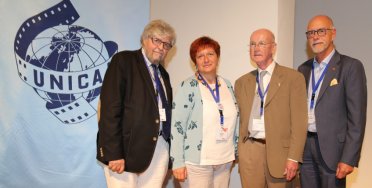
Four UNICA Secretaries-General. Left to right:
Georg Schörner, Jacqueline Pante, Arie de Jong, Jan Essing
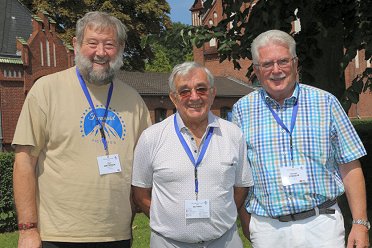
Three UNICA Presidents. Left to right:
Dave Watterson, Max Hänsli, Georges Fondeur
20. Modification of the UNICA Statutes or other regulations - proposals submitted by the Committee.
The Committee proposed to modify Statute 1.1 to insert the words: “UNICA is a Swiss association in accordance with Article 60 et seq. of the Swiss Civil Code.”
The advantage of this change would be that the Swiss Association
legal framework gives high protection to the committee and the
members. Each National Organisation would be responsible only to the
amount of their membership fee. An external law-suit would be nearly
impossible.
Approved unanimously.
21. Discussion and vote about proposals submitted by Fédération Française de Cinéma & Vidéo
[Download them as a pdf here.]
 The proposals were introduced by Marie
Cipriani. She noted that FFCV was founded in 1933 and was
unique in France. FFCV believed there was a difference between
federations and other UNICA members. The proposal was to have two
categories of membership: Federations and countries which are not
organised in Federation. The latter would have less projection time.
An example of a country without a Federation was Spain.
The proposals were introduced by Marie
Cipriani. She noted that FFCV was founded in 1933 and was
unique in France. FFCV believed there was a difference between
federations and other UNICA members. The proposal was to have two
categories of membership: Federations and countries which are not
organised in Federation. The latter would have less projection time.
An example of a country without a Federation was Spain.
Spain - Josep Rota (referencing current political events) stated that he was representing Spain, even though some films come from Catalonia.
He understood that there were two kind of organisations; however in Spain there had never been a federation. From his point of view the main problem was that clubs were disappearing, there were some but not really active, more and more was happening on the web. He considered it would not be fair if the time available were split differently between federations and other organisations.
The president invited the audience to talk about their experience. In Slovakia, for instance the National Organisation had been built from above, and had always been funded by the government, therefore the structure was different. It would be very difficult to convince people to create a federation if there were other possibilities.
The Netherlands – Kees Tervoort said that to them the position was quite clear: UNICA served countries and we did not care about politics, religion etc. The Dutch did not see an advantage in this differentiation between the members. Could FFCV explain what UNICA would gain?
Finland - Penti Kempinnen was surprised about this proposal, as it was not clear if they could come from the same country. In this case it would go against the proposal about the responsibility of the authors and the country.
Liechtenstein – Max Hänsli understood the proposals, but asked what was behind each change request? Was it that we had too many semi-professional films in our competition? Mr. Hänsli had seen the “question of Spain” arise more than 20 years ago. He thought we should rather reduce to 1/3 the semi-professional films per country.
How could we identify whether the film came from a film school or organisation? He thought the credits were a useful indicator. This might enable us to achieve a clear split between semi-professional and amateur. The jury could additionally decide in which category the film belonged if this were not done by the National Organisation.
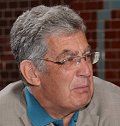 Switzerland
– Sydney Allanson: I think both positions, the French and
the Lichtenstein one would make the statutes only more complicated
and there would not be a real advantage.
Switzerland
– Sydney Allanson: I think both positions, the French and
the Lichtenstein one would make the statutes only more complicated
and there would not be a real advantage.
Austria – Georg Schörner said the relationship between the associations and UNICA is not getting better. In the end we always came to the question: „who is an amateur and who not?“ Who can decide this?
 France -
Philippe Sevestre noted that this year was the 90th
anniversary of the German association, BDFA. At the same time we had
the 80th anniversary of UNICA, which was founded in France.*
France -
Philippe Sevestre noted that this year was the 90th
anniversary of the German association, BDFA. At the same time we had
the 80th anniversary of UNICA, which was founded in France.*
At that time there were only 17 countries, now we were international. Federations and National Organisations were different.
In spite of UNICA being an amateur association, we always saw many films which were not amateurs. Professionals were people who made money with their films, however several amateur films do have credits to be able to attend other festivals. It was important to keep the spirit of the club, to collaborate and keep together.
Voting on FFCV proposal 3.1. (Two types of UNICA member):
Defeated: 18 against, abstaining: RUS+ EST, for:
FR.
[* There is argument about when the UNICA Competition, as opposed to the UNICA organisation, began. In 2013 it was agreed to denote UNICA at Fieberbrunn as the 75th anniversary, so the 80th will be in Blansko in 2018. – President ]
Marie Cipriani and Philippe Sevestre agreed to skip the voting for item 2) of the FFCV proposal as this would be a matter of discussion among the committee and to go to straight to point b) “responsibility of the National Organisations”.
This had to do with whether UNICA gave itself a degree of safety from copyright lawsuits by direct contact with the authors rather than going through the National Organisations.
France - Philippe Sevestre: You all know the French position: the authors should not have any direct contact with UNICA, because the federation/National Organisation has such contacts and the responsibility for the programme they present at UNICA.
He was also concerned that UNICA relied on a method of signing which was not legally solid. A digital signature did not correspond to an original one. He claimed that a scanned signature did not have any legal value.
In cases of plagiarism UNICA could take measures against National Organisation concerned. FFCV believes that the National Organisation had to take over this task.
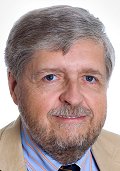 Austria -
Georg Schörner: thought that there was a big
misunderstanding: on one hand there was the direct relationship of
the UNICA with the National Organisations and on the other hand
there was simply a question about copyright clearance.
Austria -
Georg Schörner: thought that there was a big
misunderstanding: on one hand there was the direct relationship of
the UNICA with the National Organisations and on the other hand
there was simply a question about copyright clearance.
The competition organising body is UNICA; hence UNICA must be 100% covered legally.
Could not imagine that it would be feasible to apply penalties against a National Organisation, which probably did not have enough financial resources. The first body to be sued by the copyright owner would always be UNICA and not the National Organisation.
It was thanks to Thomas Kräuchi who had investigated the copyright topic, that we now have an outstanding agreement module for the authors, and on top of that we are even covered by the Swiss association law.
The President pointed out that UNICA, of course, respected the National Organisations. The choice of films was a matter for each National Organisation. What they could not do was transfer the rights. That could only be done by the author him or herself. The only difference is, that we speak to the author to get permission to show the film. Everything else remains as it used to be.
France - Philippe Sevestre: we only wanted to protect ourselves. The Swiss lawyer had forgotten to give us a clear indication that an electronic signature is not valid, so we had to pretend this.
The President answered that this was a matter of different legal opinions. Contracts had been made without written signature since the telephone came along. When fax became available remotely signed contracts had been accepted. In most countries such as the United States and the European Union a scanned signature or photographed signature was accepted.
There was no need to vote on this, several more suggestions were given, which would be discussed among the committee, point 4) is under action, point 5) the library has been discussed already.
The meeting thanked the French Federation for all the suggestions, and the stimulating discussion.
Applause for the FFCV.
22. Selection of the place and dates of the Congress for the following three years:
2018: Blansko (CZE)
Confirmed and would be presented that evening
2019: Zeist (NLE)
The Netherlands – Kees Tervoort reminded delegates
that in 2016, they had proposed to organise the 2018 festival.
Eventually the Netherlands had given the Czech Republic the
precedence so long as they would be able to organise it in 2019. The
previous day (10th of August 2017) a delegation from the city of
Zeist had visited UNICA and they had been really enthusiastic about
the congress. So we could count on support from the city. The Dutch
expected to welcome everyone in 2019 to Zeist.
The candidature for NLD was unanimously accepted.
2020: (GBR) (proposal)
United Kingdom – Alan Atkinson (referring to
current political events) said with a smile that not everybody in
Britain was in favour of Brexit and cutting off overseas links.
Looking at different venues in UK, the biggest challenge was to find
subsidiary venues and theatres. But the British were confident they
could find the proper theatres.
The application had been made orally, and therefore we voted on it.
Russia - Julia Obraztcova said it would be very difficult for Russian people to come to UK as a Visa was needed and it was very hard to obtain. How hard would it be in 2020 to enter in UK after Brexit?
The President answered that under the rules of UNICA it should be possible to come to the festival from every country. If this could not be guaranteed then we could not consider going there. It was difficult to say what would happen in the next couple of years.
United Kingdom - Alan Atkinson replied it might be difficult to obtain the visa, but we certainly did not want to make troubles entering the country.
The candidature for GBR was unanimously accepted
23. Miscellaneous, without vote.
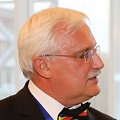 Romania -
Viorel Ieremie stated that we had a problem: organising
young UNICA. We would need to find a rule for the organising
committee. We would need to make UNICA more attractive for younger
participants. It was important to encourage younger participants as
UNICA was becoming older and older and we needed young people. He
asked what the future organising countries were planning for younger
participants?
Romania -
Viorel Ieremie stated that we had a problem: organising
young UNICA. We would need to find a rule for the organising
committee. We would need to make UNICA more attractive for younger
participants. It was important to encourage younger participants as
UNICA was becoming older and older and we needed young people. He
asked what the future organising countries were planning for younger
participants?
The Netherlands - Kees Tervoort replied that in 2019 the Dutch would really organise a Young UNICA; as had been done in 2011 in Luxembourg with a youth camp of roughly 35 young participants. If the economic resources would allow it, they would have a similar group as in Luxembourg with workshops, filming, editing etc.
 Germany -
Markus Siebler commented that this was good news. In
fact right here in Dortmund he had become aware that we had “young”
problem, which went beyond workshops. It touched our national
competition, but also what was offered in the evening, for instance
younger people did not go to the gala dinners and restaurants, a
disco would be more appropriate.
Germany -
Markus Siebler commented that this was good news. In
fact right here in Dortmund he had become aware that we had “young”
problem, which went beyond workshops. It touched our national
competition, but also what was offered in the evening, for instance
younger people did not go to the gala dinners and restaurants, a
disco would be more appropriate.
Germany - Bernhard Lindner noted that we were writing a manual for future organisation committees of UNICA Congresses. In it there would be clear indications of what the organisation needed to do. However, we could not expect that an organisation commit itself to a young programme if the younger ones did not register. We could invite them to organise the programme and the festival so that that there were possibilities for the younger groups. In Suceava for instance some youngsters had complained that they could not participate in the main programme. This had to be considered too.
The Netherlands - Franka Stas remarked that we had a very successful workshop in Suceava, though there were not so many countries as we had expected in spite of free board and rooms. Organising the young programme was linked to a number of critical points: resources of National Organisations with little money, timing of National Organisation competitions, (if their event was rather late, it was difficult for them to arrange the presence of young participants.) Could we change the plans? A lot of young people have plans during the summer. How could we make sure that we can announce the Young UNICA programme sooner, to make it possible to send the young people?
Germany - Wolfgang Freier remarked that in earlier times Poland and Germany had received financial support from the EU, but this had to be requested a long way ahead.
Luxembourg - Nico Sauber reported that in 2011 Luxemboug had applied to the EU, for financial support. This was a tremendous work, as all the plans and budgets needed to be really detailed. All the accounts had to be very detailed and the money not spent had to be returned.
Romania – Viorel Ieremie commented that we all know how much resources the EU has for education and culture. However, all the National Organisations could do something. For example Romania had managed to get the money, the only solution was to involve local sponsors.
 Norway -
Turid Mathinsen noted that the average age of delegates
was quite high and asked what would happen with UNICA in the next 10
years? He asked what we meant by young people: was it from 18-25ish?
What was the programme for them? It was important that they see
films too. Had we ever thought of special screenings for them,
separate programmes?
Norway -
Turid Mathinsen noted that the average age of delegates
was quite high and asked what would happen with UNICA in the next 10
years? He asked what we meant by young people: was it from 18-25ish?
What was the programme for them? It was important that they see
films too. Had we ever thought of special screenings for them,
separate programmes?
Switzerland - Sydney Allanson picked up the earlier suggestions of Max Hänsli concerning the film schools. He thought that UNICA could be seen as a springboard for young professionals, therefore he would like to invite the committee to consider the limitation of the screening time for film schools to 1/3 of the whole programme.
Final remarks from the President
Tunisia would be punished with a reduction of their showing time to 45’ instead of 60’ due to the fact that the National Organisation had been very late with the applications and films.
The amateur status of a couple of films from Austria and Spain had been questioned. After having discussed this with the national delegates and checked, where possible, the committee had decided that the films were genuine amateur films.
UNICA was very proud to be part of the 90 years anniversary of BDFA
and we congratulated the organisation for this enormous success.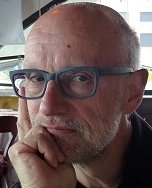
At the end of the General Assembly, the president, Dave Watterson presented to Mr Rolf Leuenberger a decorative plate as a sign of thanks for his long service for UNICA.
The General Assembly closed at 6pm.
Addendum to the 2017 General Assembly Minutes
Since item 21 of the 2017 General Assembly Minutes does not clearly state that the application from the Liechtenstein national organisation has been considered the following addendum will be submitted, with a request of consideration when approving the minutes:
The Liechtenstein proposal was also taken into consideration and discussed in the course of the discussion about the proposal by the French Federation FFCV. Both organisations, the French and the Liechtenstein one, proposed similar amendments. The proposal from Liechtenstein has been explained by the delegate Max Hänsli. The sound records of the discussion were listened to again. Both proposals were effectively taken into account both in the discussion and in the vote. For practical reasons, the two motions were put to one vote, both motions were rejected by the majority.